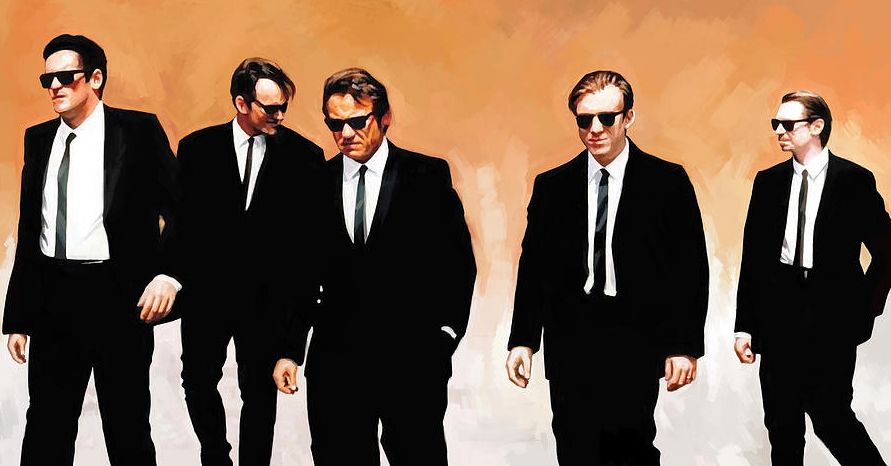
Reservoir Dogs - A retrospective review
Mr. Pink: You kill anybody?
Mr. White: A few cops.
Mr. Pink: No real people?
Mr. White: Just cops.
And just like that a new genre of cinema was born. One that borrowed from a host of other genres and directors; and yet was so ingeniously original, that it took the world by storm.
Quentin Tarantino’s masterful mayhem, Reservoir Dogs, came pretty much out of nowhere and took the festival circuit by storm and introduced people to a kind of movie going experience that they have now, rather unoriginally (yet in a reverential tribute) named Tarantino-esque.
A small budget movie that attracted a top notch cast nevertheless (on the back of a solid script), Reservoir Dogs breathed new life into Independent films. The set-up is simple and complete by the time opening credits roll. 6 strangers have been assembled by a mob boss for a fairly simple heist – each is identified by a color – Mr. Orange, Mr. White, Mr. Brown, Mr. Blue, Mr. Blonde and Mr. Pink. “Pink? Why Pink? Why can’t I be Mr. Purple?” laments Mr. Pink (Steve Buscemi), “Coz you are a faggot and coz some other guy on some other job is Mr. Purple. You are Mr. PINK!” growls Joe Cabot (Lawrence Tierney). When the heist goes wrong, two members die and 1 fatally wounded, the surviving criminals begin to suspect each other of being the mole in the group.
The movie is all about the characters that inhabit it. Quentin Tarantino’s success lies in making us believe that these despicable men lead these lives, not lifestyles. That’s the one thing that separates the master that QT is, from the countless impersonators who have tried to ape his style of film-making. He uses razor sharp dialogues to tell us more about these characters, than any shoot out ever could. All of his mastery in writing that people have now come to expect from Tarantino is in full evidence here –all sorts of topics are discussed at length – Madonna, waitresses and tipping, bathrooms and cops. All these are pretty much irrelevant to the story and yet, it is these exchanges that truly make the movie stand out. Just watch the opening breakfast scene – the job is not discussed, no one pulls out a gun and there is no reference to back stories ofany of the characters and yet, you know you are in for a heck of a ride as they stride out of the diner in the now famous slow motion walk that accompanies the opening credits.
The entire gamut of trademark Tarantino is on display – sudden, short, brutal bursts of violence, numerous pop culture references, use of atypical (yet spot-on) soundtrack, dividing the movie into chapters, use of nonlinear narrative structure. The last of these has been used brilliantly to build back stories for each of the characters such that by the end of the movie you know them a lot more intimately. Pay particular attention to Mr. Orange’s flashback and notice how there are multiple back and forths in timelines within the same flashback of the ‘Commode Story’. Nonlinear story telling is used so often now to be reduced to a gimmick but back then it was a revelation and most importantly, it was used to tremendous visual impact.
The movie boasts of a star cast that could elevate even the most humdrum of scripts. Keitel, Roth, Buscemi, Tierney, Penn and Madsen are explosive on screen and their rat-a-tat exchanges of dialogue crackle with intensity. Each one has his moments – from Buscemi’serudite views on tipping waitresses (“I don’t tip because society says I have to”), to Roth’s Commode Story, to Keitel’s fiery exchange with Mr. Pink (“The choice between doing ten years and taking out some stupid motherfucker, ain’t no choice at all”). And then there is Michael Madsen in a role so brutal, you’d be forgiven if you loathed his face for the rest of your lives. Playing Mr. Blonde as the kind of guy you’d never want to cross paths with, Madsen is terrifyingly terrific. Mr. Blonde is least bothered about finding out the identity of the mole, he is just fascinated with the idea of torturing a cop – it is impossible to not flinch when his blade reaches the cop’s ear.
This movie, along with Tarantino’s next and arguably most celebrated motion picture – Pulp Fiction, really did create a new world of film making. Movie-makers world over try and make a ‘Tarantino-esque’ film to add to their oeuvre and yet, you need to watch just one scene from any film of his to distinguish the master from the apprentice.
There are those who accuse him of reveling in the excesses of violence and nihilism, and they may not be entirely wrong. However, the one thing you cannot accuse Tarantino of, is lack of originality – no director has impacted cinema in the last 25 years quite like he has. As Nice Guy Eddie says, “First thing fuckin’ last” – there is no one like Quentin Tarantino.
